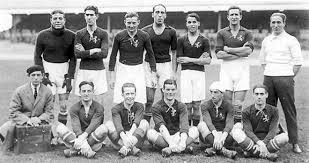By David Owen
September 1 – It is exactly 100 years since, Spain, nowadays one of the powers of the global game, appeared in its first international football tournament.
The competition was the 1920 Olympic football contest, played in war-ravaged Belgium and won by the hosts.
What is more unusual is that Spain ended up with the silver medals, in spite of being dispatched by the hosts in the quarter-finals.
La Roja’s first match, in Brussels on August 28, brought a 1-0 win over Denmark. Today, that would not classify as an upset, yet the Press Association’s Special Correspondent described it as “another football surprise”, adding only that “Nils Middelboe, captain and centre-half of the Chelsea team, captained the Danish players”.
The following day came the 3-1 defeat to Belgium and, seemingly, the end of the road in the tournament proper for the debutant Spaniards.
A sort of consolation series involving the four beaten quarter-finalists was, however, arranged – and here the Spanish team came into its own, with unexpected consequences.
One hundred years ago today, on 1 September 1920, they beat Sweden 2-1 with two second-half goals. Next day, in a game that acted as a curtain-raiser for the final, they beat Italy 2-0 in front of 10,000 spectators at the Olympic Stadium in Antwerp.
A few hours later, the Czechoslovakian team that had qualified to take on Belgium in the final marched off the pitch in protest at refereeing decisions. They were eventually disqualified from the tournament.
In the absence of one beaten semi-finalist, France, many of whose players had seemingly gone home, it was decided that the silver and bronze medals would be determined by a match between the other beaten semi-finalist, Holland, and Spain, the best beaten quarter-finalist.
This game, played three days after the final on 5 September 1920, was won by the Spaniards 3-1, thanks in part to two goals from Barcelona’s Félix Sesúmaga, a Basque forward who was to die from tuberculosis just five years later.
The growing popularity of football in Spain at this time was partly the work of the monarch, King Alfonso XIII.
According to an article in the Birmingham Daily Gazette dating from early August 1920, “Under the influence of the King of Spain, youth is taking to football and Seville, known as the city of bullfights, has this year had its first football cup-tie”. The article went on: “Sometime before that event, King Alfonso issued a Royal decree announcing that regimental football clubs were to be formed in all branches of the armed forces.”
Contact the writer of this story at moc.l1734877418labto1734877418ofdlr1734877418owedi1734877418sni@n1734877418ewo.d1734877418ivad1734877418

